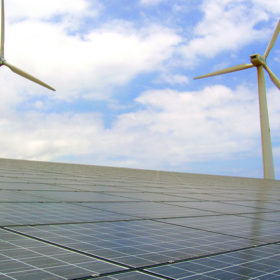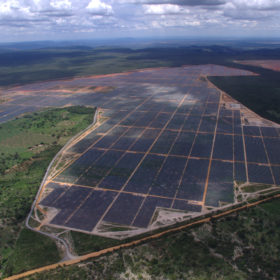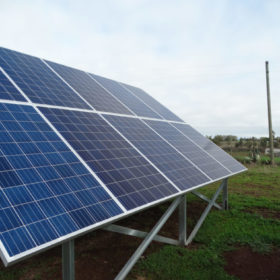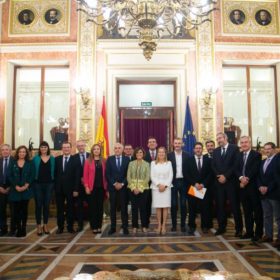Argentina launches 400 MW mini renewables auction
Some 350 MW will be divided between wind and solar for projects of 500 kW to 10 MW in scale. The ceiling price for solar and wind has been set at $60/MWh.
FVR closes financing for 50 MW of solar in Spain
Grupo Cobra will be responsible for the construction of the plant, which will comprise 151,500 PV modules of 330 Wp, mounted on a horizontal single axis solar tracking system and 27 inverters. The facility will occupy an area of 161.2 hectares.
Spain wants 100% renewable electricity by 2050 as part of climate change strategy
The Law on Climatic Change being prepared by the Spanish government provides greenhouse gas emissions be reduced by 20% compared to 1990 levels in 2030, and that the electric system has 70% generation from renewable energy sources. By 2050, the targets will be raised to 90% and 100%, respectively.
Nothing can stop Spain’s solar train now
At an event held in Madrid this week, the Spanish solar sector made it clear that it is more than ready to achieve the government’s renewable energy targets, which include 50 to 60 GW of new PV capacity by 2030. The sector is experiencing a rebirth.
Solarpack plans to launch €100 million IPO
The Spanish developer said that funds from the IPO will be primarily invested in the execution of its 510 MW PV project pipeline.
Enel begins construction on 127 MW of PV in Spain
Construction has begun on three solar plants in the Extremadura region, with a total capacity of 127 MW. The projects – expected to be in operation by the end of 2019 – were awarded to Enel in Spain’s third renewables auction, and involve a total investment of close to €100 million.
Enel begins work on 475 MW solar plant in Brazil
Enel will invest around 1,400 million BRL ($390 million) in the construction of the São Gonçalo solar plant, located in the state of Piauí. The 475 MW project is currently the largest PV plant under construction in South America.
Use of PV can reduce diesel consumption in energy-intensive cultivation in southern Europe
Italian, Spanish and Portuguese scientists have published a study about energy consumption and the environmental footprint of the use of solar-hybrid irrigation systems in olive plantations in Portugal and Morocco.
Spain may introduce additional measures to support self-consumption
A few days after the Spanish government introduced new rules for self-consumption and canceled the solar tax, the Spanish Parliament is now reviewing new provisions to reduce the time frame of the registration for a project under the self-consumption regime, while also simplifying bureaucratic procedures.
Farewell to Spain’s solar tax
The Spanish Cabinet has approved a royal decree, which introduces a package of urgent measures to boost the country’s energy transition. It includes the already announced elimination of the “sun tax”, and other important measures, such as compliance with renewable energy objectives, electric vehicle adoption, reduced electricity prices, a social bonus for heating, consumer protection measures, and the extension of an electric social bond.










